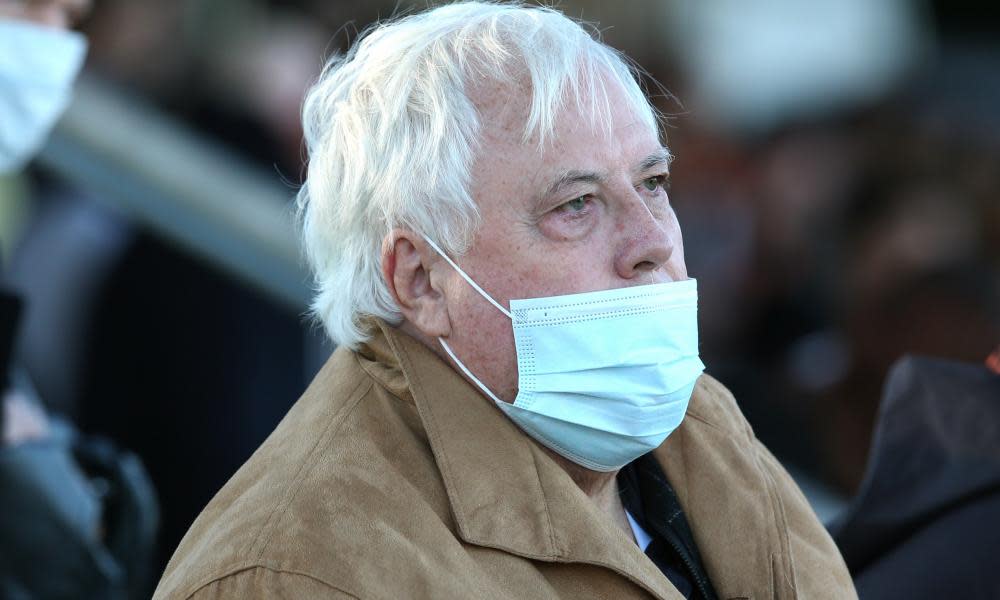Clive Palmer disregards TGA call to stop spreading ‘misleading’ vaccine material

Clive Palmer is defying a call from the Therapeutic Goods Administration to stop spreading “misleading information” as his new pamphlet containing disputed claims about the impact of vaccinations is being distributed across the country, including to residents in greater Sydney.
The latest direct mail-out is a public response to the TGA’s criticism of his previous advertisements. It quotes figures published by the TGA on post-vaccination deaths and adverse reactions out of context, criticises the body for not ceasing the vaccine rollout, claims there is no pandemic in Australia, and accuses the TGA and the government of spreading misleading information. It has also prompted Labor to complain to the Australian Electoral Commission asking it to investigate whether the pamphlet was subject to or met political authorisation requirements.
While digital companies, including Facebook, have agreed to a code of conduct for misinformation – which has led to Covid-19 posts by the former Liberal MP Craig Kelly being removed from the site and his subsequent permanent ban from the platform – there is little to regulate the content of traditional political advertising.
After Palmer authorised a series of radio advertisements that the TGA found misrepresented the adverse health effects of Covid-19 vaccinations, the head of the TGA, John Skerritt, wrote to him, reminding him that “public figures have a responsibility to be factual and not to undermine our health through spreading misleading information”.
“Such misinformation, in the course of the Covid-19 pandemic, poses an unacceptable threat to the health of Australians,” Skerritt wrote.
The ads were later taken off air by the Grant radio network.
After this latest pamphlet mail-out, Labor’s health spokesman, Mark Butler, wrote to the AEC on Thursday asking it to investigate whether the material breached authorisation requirements given it appeared to be “electoral communication”.
“The Covid-19 vaccine rollout and the government’s response to the pandemic are clearly issues which will influence the way electors vote at the next federal election,” he wrote. “The subject matter makes it more likely that the dominant purpose of the flyer is to influence the way electors vote at the next election.
“Particularly in greater Sydney, where millions of Australians are currently in lockdown and this material is being distributed, the content dangerously contradicts the health advice.”
The health minister, Greg Hunt, said the TGA was reviewing the Covid misinformation coming from Palmer, and was dealing with him directly.
“But let me be clear, he’s not succeeding,” Hunt said. “200,000 Australians stepped forward yesterday to be vaccinated. We are also seeing an increase in the intention to be vaccinated.”
He said latest government data showed that 77% of Australians intended to get vaccinated, and another significant portion were considering it.
“So as time has gone on, the number of people intending to be vaccinated is going up,” Hunt said.
“So I think that that is an important message that those people who believe in vaccination are winning the argument; those people who are spreading misinformation or anti-vax materials are losing the argument.”
The TGA said the material distributed by Palmer was not covered by its regulations relating to medical products, but concerns had been raised directly.
“Australians should only rely on information from australia.gov.au and health.gov.au, which are the official Australian government websites for Covid-19 information,” it said.
Adverse events after vaccination did “not mean the event was caused by vaccination” as suggested by Palmer.
“Large scale vaccination means that coincidentally some people will experience a new illness or die shortly after vaccination,” it said.
“We also monitor signals that may relate to vaccine safety to distinguish between coincidental events and possible side effects of the vaccine. Part of our analysis includes comparing natural expected death rates with observed death rates following immunisation.
“So far, the observed number of deaths reported after vaccination remains less than the expected number of deaths that would occur naturally, or from other causes, for that proportion of the population.”
In his latest pamphlet Palmer refers to his implied right of political free speech as a “former member of the House of Representatives and a chairman of a registered political party under the electoral act” and accuses the TGA of defaming him in its criticism.
In response to questions about the messages he was distributing, Palmer said only: “We don’t talk to the Guardian.”

 Yahoo News
Yahoo News 
